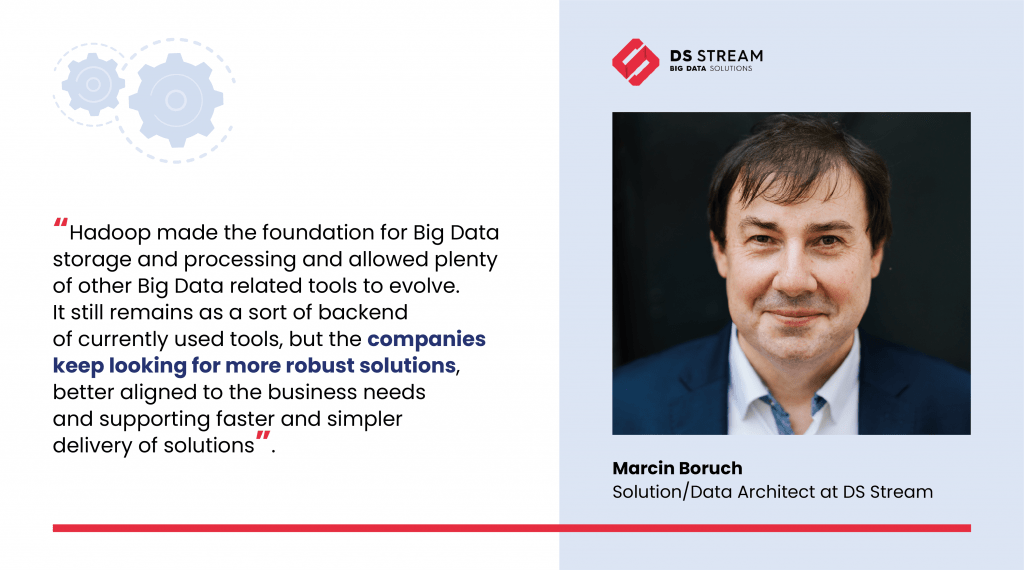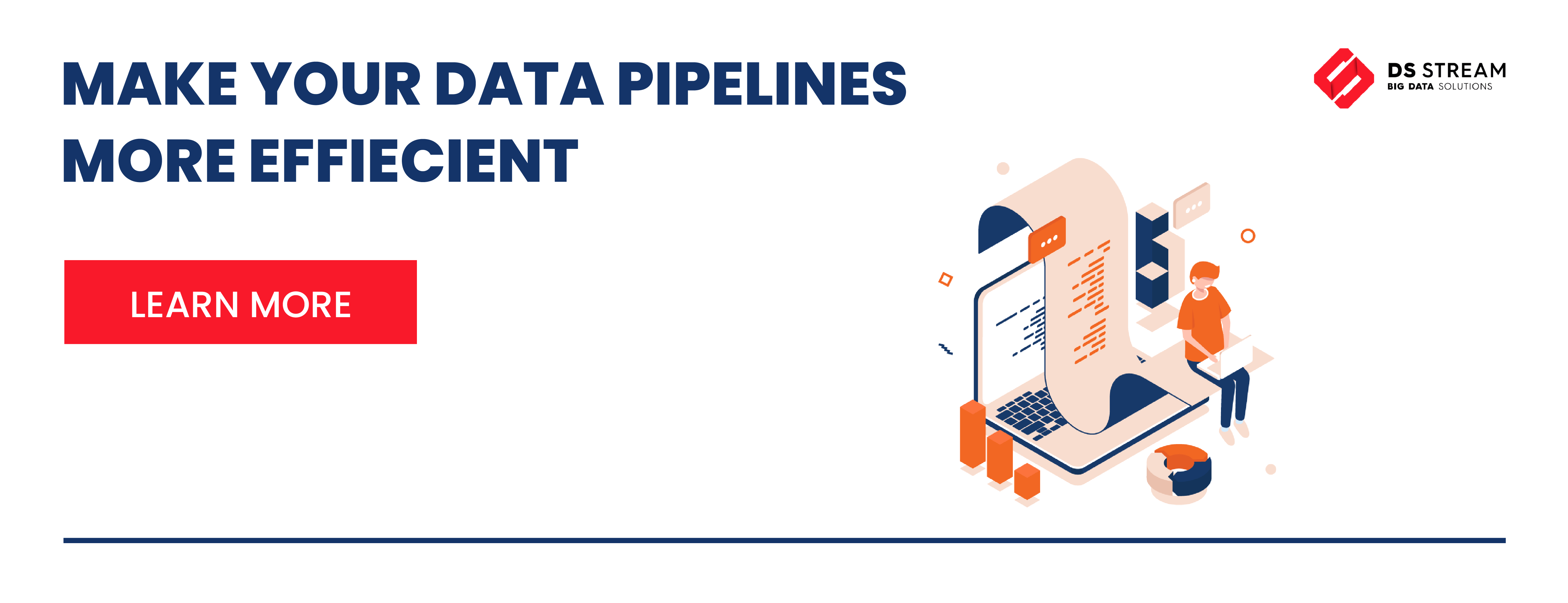
-
2 June 2021
- Big Data
Nowadays, companies are collecting huge amounts of data from multiple sources – social media, websites, mobile and web applications, industrial machinery and others. Specific, powerful tools are required in order to handle those vast quantities of information. Hadoop gained popularity long ago and has been used by companies all over the world for many years. The world keeps changing though and other technologies are being considered by more and more organisations – one of them is Google BigQuery.
Although BigQuery is not new software, it is becoming quite popular nowadays in enterprises. For those who have been using Hadoop till now there are two important questions: is BigQuery actually a better choice than Hadoop and how do you use it properly to benefit from it? Are you wondering if you could handle your data better? If you’ve heard that BigQuery could replace Hadoop in the near future, first start by learning what BigQuery is and why some consider it better than Hadoop.

Handling Big Data in an enterprise
Processing big amounts of data can be a difficult task, especially since the data comes from so many different sources and there could be even more sources in the future. Enterprises need to increase processing speed all the time to be able to benefit from data analytics. Businesses change and so does the market – there is no surprise in the fact that those technologies and pieces of software that were “sufficient” earlier are becoming outdated and others are getting more popular with the passing of time. Hence, new techniques and methods of cleaning, processing and analysing unstructured data are being developed and adopted by enterprises. It can sometimes be hard to pick from various solutions, decide to change your current technology or even fully understand how some of the options differ.
A lot of people still consider analytical solutions through traditional data warehouse paradigm and here there is a place for BigQuery, as an idea, which originates from older ones, but due to its scalability and elasticity it allows enterprises to store and process structured and semi-structured data, so this way to quickly jump to Big Data and even Machine Learning world.
Marcin Boruch, Solution/Data Architect at DS Stream
The difference between batch processing and real-time processing
Before we get to the comparison of Hadoop and BigQuery, we have to mention the difference between batch data processing and real-time processing, which have both become extremely popular and which are crucial for the operation of many companies. Those types of data processing require different tools and have different applications.
Batch data processing
Let’s assume that your company has collected a high volume of data in some period of time. Batch data processing is an efficient way of processing such data. Data is first collected and then processed after some time, so there is a big amount of data processed at once. Batch processing can be performed offline and at the moment chosen by the person in charge. Hadoop is a great tool for batch data processing. As most organizations nowadays perform it, that is why Hadoop is so popular. But it may occur that a company needs real-time processing, which is rapidly growing in popularity. What then?
And what about real-time data processing?
Can Hadoop handle real-time data processing? The answer is: not really. Unfortunately Hadoop is not the kind of tool you should use for efficient real-time data processing. This way of handling data allows companies to make decisions and take actions almost immediately after receiving information. Real-time systems are used in air traffic control, banking (in ATMs, when customers need to see a current view of their finances seconds after performing a transaction) and many other industries.
Need some help with handling Big Data? Check our Data Pipeline Automation services
Hadoop – what is it?
Apache Hadoop is a framework for massive storage and batch processing of data. It is used by companies all around the world. Hadoop is appreciated for its maturity and access to multiple libraries. As it is open source, using it in your company can help you reduce the costs of handling data – open source technologies are free of charge. It can be deployed on a company’s own infrastructure, or it can be run via the cloud. The core of this framework consists of two parts:
- Hadoop Distributed File System – in short HDFS, which is the storage part of Hadoop
- MapReduce – the part responsible for processing data
It is a great tool for distributed processing of very large data sets on computer clusters built from commodity hardware. Using it, your specialists can process collected information any time while offline. Hadoop can help your organization reduce the costs of efficient data processing. It requires some specific skills from your company’s experts, so it may take some time for them to learn how to use it properly.
Google’s BigQuery – what is it used for?
BigQuery is a highly scalable cloud-based analytics data warehouse. It is meant for enterprises that want to benefit from a serverless solution for storing and querying their data. This tool is capable of dealing with massive datasets and providing organisations with useful business insights. The program uses the processing power of Google’s infrastructure, and it uses machine learning. It can be used for:
- Loading and exporting data – your employees can quickly load data collected by your company into BigQuery, process it with this system and then export it to gain high quality analysis.
- Querying and viewing data – BigQuery enables companies to run interactive queries, batch queries and present the data using visualization tools.
- Managing data – you can easily work with datasets (for example, updating them or deleting some data), list projects and organise your data into tables.
BigQuery makes analysing data easier and enables analysis in real-time. You can collaborate by sharing reports with other users. So should you use it instead of Hadoop?
Is BigQuery a good alternative to Hadoop?
BigQuery is often described not as a replacement for existing technologies, but rather as a tool that should complement them. If you are already using Apache Hadoop for processing data, you should certainly consider the benefits of adopting BigQuery for analysis, because it will enable your company to take advantage of real-time analysis. Keep in mind that both those tools differ significantly.
First, BigQuery is a data warehouse – you need to import data into it – and Hadoop is a framework (a data processing platform) – you add your files to HDFS. There are some ways to make Hadoop behave like a database – by using SQL engines, Spark or other tools- but it is not its original purpose. In the end both BigQuery and Hadoop can handle massive amounts of data. And in the end both of them generate some costs for the company.
Google BigQuery is serverless, while Hadoop is not. If you use Hadoop, scaling the capacity of your systems is up to you. If you use BigQuery, you don’t have to worry about it, because Google is responsible for scalability. This certainly means that BigQuery will be easier to manage for your in-house team. You need to remember though that using BigQuery is for free only to some point, while Hadoop is open source (so free), but requires paying for server hardware.
Decision makers just need to have a relevant assessment of both Hadoop and BigQuery and decide based on their features. It is especially important in the case of BigQuery, to be aware of its quotas and limits as well as that selecting BigQuery directs the choice to Google Cloud Platform as enterprise cloud.
Marcin Boruch, Solution/Data Architect at DS Stream
To sum up
Which one to choose? There are plenty of tools for data processing. BigQuery’s main pros are that it is fully managed, can perform real-time analytics, is efficient and highly scalable. It can also help you reduce the costs of managing your company’s data, but that doesn’t mean that Hadoop would be a bad tool for your business. Think of your company’s needs before you make a decision. The choice of technology should be always preceded by careful analysis of particular business needs. Don’t hesitate to contact our consultants if you’re not yet sure what would be the best data processing solution for your company.
Check out our blog for more details on Data Pipeline:


